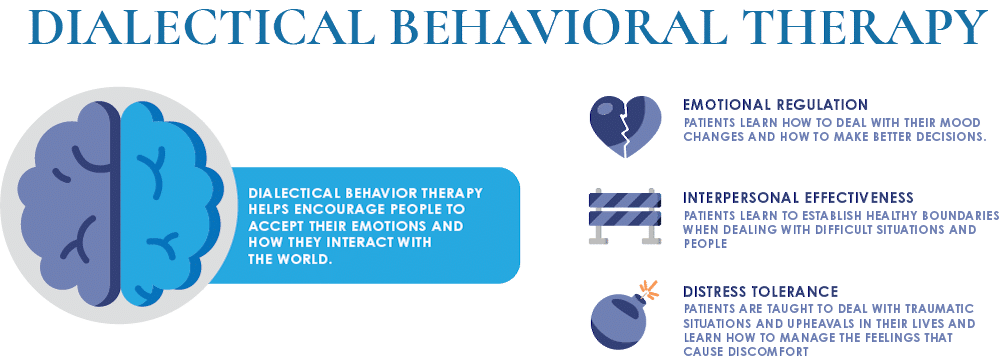
Addiction treatment programs exist to help people with substance abuse disorders (SUD). These programs help individuals suffering from addictions to successfully manage their symptoms and live a life that is free of addiction.
There are many different types of treatment for SUD, such as outpatient rehab in Massachusetts. The same goes for addiction therapy services. Therapy is a cornerstone of addiction treatment. Often, people use drugs to cope with negative feelings, trauma, or other problems in their lives.
If these feelings are not addressed properly, an individual will potentially turn to drugs as a coping mechanism. Counseling such as DBT for addiction can help those suffering from addiction address the underlying causes so that they no longer feel the need to use drugs and alcohol as a crutch when triggered.
There are many types of addiction therapy. Group therapy, individual psychotherapy, and family therapy are a few of the most popular forms of therapy you’ll find in addiction treatment programs. Behavioral therapies are another type of highly successful addiction intervention that can help separate feelings from the need to cope with self-destructive behaviors.
If you’re seeking dialectical behavior therapy for substance abuse, you’ve come to the right place. Chapters Recovery in Danvers, Massachusetts can provide you with the help you need.
What is Dialectical Behavior Therapy (DBT)?
Dialectical behavior therapy (DBT) is a type of cognitive-behavioral therapy (CBT), developed in the late 1970s, by Marsha M. Linehan, a psychology professor at Loyola University. The goal of DBT is to help individuals struggling with thoughts and behaviors that lead to overwhelming emotions to identify and change self-destructive behavior patterns. When it comes to drug addiction, the behavior that needs to be changed is drug or alcohol abuse.
Originally, dialectical behavior therapy was designed to treat borderline personality disorder but has also been highly effective in treating drug addiction, it also benefits individuals who are also suffering from a mental health disorder. Typically, people who struggle to manage their emotions and dysfunctional behaviors are excellent candidates for DBT. This is present in both people with substance use disorders.
Traditionally, dialectical behavior therapy treats people who have serious psychosocial disorders or people with suicidal behaviors. Over time, DBT for substance abuse was developed to promote a “clear mind” and complete abstinence in patients with SUDs or substance abuse issues. By augmenting the concepts and modalities used in DBT for substance abuse, clinicians helped patients who were not responding well to traditional treatments.
The Difference Between CBT and DBT

If you’re seeking DBT for substance abuse in Massachusetts, you may have a few questions. One of these common questions may be what is the difference between CBT and DBT? While these two psychotherapies are related and serve as effective treatments for mental health issues and behavioral problems, they are also very different.
Both CBT and DBT treat addiction issues in a clinical setting. However, CBT originally treated depression and anxiety, while DBT treated borderline personality disorder (BPD). These therapies’ effectiveness in treating mental illnesses is why they are currently used during addiction treatment programs. This is because there are many similarities between mental health conditions and SUDs, with some people having both a SUD and co-occurring mental health disorder that contributes to their drug use.
The main difference between these two therapies is the philosophies they are based on. Philosophically, CBT relies on reason and rationale. Patients learn to think critically about situations that cause negative feelings and lead to drug use. Dialectical behavioral therapy focuses more on mindfulness by promoting an awareness of one’s emotions. The idea is that once a patient can recognize their emotions, they will be better able to manage negative feelings that lead to abusing substances and addiction.
What Can I Expect During Dialectical Behavior Therapy?
During DBT sessions, you can expect to focus on your drug use and any other issues that are relevant to your treatment. The therapy process is commonly divided into four modules. Each module focuses on different aspects of the patient’s life. The modules include mindfulness, distress tolerance, emotional regulation, and interpersonal effectiveness.
Mindfulness
Mindfulness is a practice where people are asked to be present in situations. Patients practice existing in the present moment rather than in their thoughts. Instead of reacting to situations with negative behaviors and thoughts, patients are prompted to practice acceptance. By accepting the current situation and not focusing on a perceived lack of control, patients can avoid catastrophic negative feelings.
Mindful practices help patients to identify their emotions, which can lead to better reactions. Mindfulness can take place through meditation exercises, where the patient is prompted to focus on the present moment. Through mindfulness, patients learn coping skills that can be used during times of distress and urges.
Distress Tolerance
The distress tolerance module focuses on teaching patients how to manage their emotions in stressful situations. This helps patients to accept the situation and avoid high-risk situations. DBT teaches patients how to distract themselves during high distress from difficult emotions, by focusing on positive aspects of their lives or thinking about the bigger picture.
Emotional Regulation
A SUD can result from a lack of emotional regulation. An addict may respond to overwhelming negative emotions by taking drugs to numb their pain and feelings. The emotional regulation module of DBT teaches patients how to become aware of their emotions and create strategies for handling them. Patients learn to accept all their emotions as valid, instead of avoiding or resisting them.
Interpersonal Effectiveness Skills
This module teaches patients how to navigate social interactions successfully. The training focuses on expressing themselves effectively in relationships with others, either by being more assertive or a better listener. Patients learn skills to build healthy relationships with family, friends, and coworkers. They also learn to say no clearly when it’s necessary to establish boundaries.
The Components of a DBT Program
Along with the modules of dialectical behavior therapy are different components. These components of DBT aid with emotional regulation and the facilitation of positive behavioral changes.
Skills Training
During skills training, patients gain sets of skills to help better cope with stress, emotions, and relationships. Therapists teach patients skills that help them avoid life-threatening and quality-of-life-degrading behaviors such as drug abuse. At some drug rehabs individuals participate in group skills training which provides a place to practice new skills, such as communication skills, and make connections with peers.
Individual Therapy
In individual therapy sessions, therapists attempt to aid the patient in understanding their behaviors and thought processes. Most importantly, therapists assist patients in changing these maladaptive behaviors and attributing them to productive avenues.
Group Therapy
In group therapy sessions, patients learn skills that are similar to the ones they learn in individual psychotherapy settings. Patients who participate in DBT group therapy often meet weekly for group therapy. During these sessions, patients receive support, empathy, and understanding to help them overcome substance abuse.
Phone Coaching
For patients who cannot make it to in-person sessions, for whatever reason, phone coaching is available. Therapists can coach patients through DBT skills over the phone, which is helpful for those who struggle with transportation or for other reasons cannot make it into sessions.
How DBT Helps Treat Addiction

Dialectical Behavior Therapy (DBT) is an effective approach to substance abuse treatment, particularly for individuals struggling with co-occurring substance use disorders and mental illness. DBT combines individual therapy, group skills training, and other therapeutic techniques to address alcohol addiction and substance abuse. By focusing on building healthy coping skills, emotion regulation, and distress tolerance techniques, DBT equips individuals with the tools to manage cravings, prevent relapse, and address the underlying factors contributing to their substance use. It also helps individuals develop a greater sense of self-awareness, resilience, and improved overall mental well-being, supporting long-term recovery and improved quality of life.
The Goals of DBT for Addiction Treatment
Successful DBT for addiction recovery focuses on measurable goals to address substance abuse. It aims to reduce drug use and cravings, avoid negative consequences, reinforce healthy behaviors, and restore a sense of control in one’s life. By developing healthy coping skills and addressing intense emotions, individuals can make positive choices, handle everyday problems, and regain a sense of completeness. Dialectical behavior therapy helps individuals with substance use disorders reframe challenges as solvable issues and engage emotionally instead of using drugs as an escape.
Receive Effective DBT for Substance Abuse in Massachusetts
No one experiences addiction in the same way, despite the many commonalities between cases. Additionally, no two DBT programs in Massachusetts are the same. Our comprehensive addiction therapy services meet each patient’s individual needs through their design. Our dialectical behavioral therapists, trained to treat the complex dynamics between emotions, thoughts, and actions, work on an individual level with each patient to promote healing and sobriety.
If you are seeking DBT for drug or alcohol abuse in Danvers, Massachusetts, or the surrounding areas, we can help. Here at Chapters Recovery, we offer specialized treatment for patients living with addiction or a co-occurring mental health condition. We provide a comprehensive treatment program with outpatient options. To learn more about how dialectical behavior therapy can help you overcome an addiction to drugs and alcohol, contact us today.

